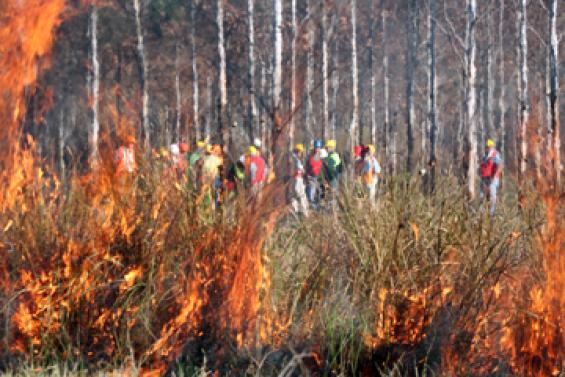Environmental Management and Ecological Sciences
The challenge for courses in environmental management, earth and ecological sciences is to help build capacity and skills so that communities can respond wisely to the complex changes expected in the next decades.
The skill areas needed include:
- Forecasting - an ability to predict change; environmental, social and economic
- Decisiveness - skills to weigh the risks and trade-offs - short term vs long term, the impacts of what we do or don't do now, how future scenarios are influenced by our action or inaction
- Negotiation - to manage principles, objectives and outcomes with government, stakeholders and communities
- Implementation - achieving an adaptive management framework
More specifically, fire managers will need to understand changes in our risk environment and how these impact on:
- ecological responses in flora and fauna
- timber harvesting
- water yield and quality
- asset protection and risk reduction
- other ecosystem services such as carbon storage and tourism.
The following diagram shows seven key perspectives that a course designer might consider to develop skills in relation to the management of fire in the landscape. These perspectives aim to give a sense of the whole, rather than be clearly demarcated categories.

How to use the framework
A lecturer in the fields of plant or zoological sciences may be interested primarily in the ecological sciences perspective. They might draw on some elements of fire behaviour in terms of fire intensity and combustion and how this might impact on flora and fauna. They might be particularly concerned in developing effective monitoring protocols to measure the relationships between fire and health and propagation of particular species. They may need to bring a landscape perspective in understanding fire regimes and recovery.
Students would develop capacities for thinking complexly, understanding that fire ecology is specific to particular vegetation and geographic locations with competing species requirements. They would be able to recommend protocols for prescribed burning of different habitats.
A lecturer in environmental management may draw on all the perspectives in helping students to develop a big picture view of the issues of fire management. In particular students might explore the role of prescribed burning in fire management using each of the perspectives, highlighting competing issues and looking for decision making frameworks that can help them manage these.
A lecturer in the geographical sciences might be interested in the climate change and landscape perspectives. Students might learn geographical spatial techniques to measure and predict the impacts of fire. They might be engaged in scenario building.
Potential Students
Undergraduate Students
Participating in undergraduate degrees in biological sciences, earth sciences or environmental management.
These students are preparing for challenges that they need to face in the next 5 to 10 years in which potential employers will expect them to have the skills to meet. They are likely to find jobs in Land or Resource Management, Environmental Impact Assessment, Environmental Policy Development, Environmental Interpretation, Restoration or research. They need to gain principled understandings in fire ecology and management that are transportable across states.
Graduate Students
Grad Dip / Grad Cert - Environmental Management
Completed degrees in biological, environmental or earth sciences, law, management.
These students are looking for a vocational qualification that can lead to specific employment in Environmental Management. They bring varied backgrounds. Key employers of graduating students are the state land management agencies who have a prime responsibility for management of fire in the landscape. While these agencies have their own considerable "in house" training programs on the practical aspects of prescribed burning and suppression of bushfire they require graduates to bring big picture understandings of the issues informed by sound principles.
Existing Professionals
Grad Dip / Grad Cert / Masters
Coming from positions in environmental management, environmental assessment and restoration, environmental policy.
These professionals (who already have undergraduate degrees in environmental, ecological or earth sciences) are working in situations where they are required to deal with issues relating to fire in the landscape and are looking at moving into more managerial or strategic positions. They are looking for "leading edge" understandings or thinking tools that can help them deal with increasing complexities and the emerging demands of climate change. They are looking for short courses which put them along side experts and enable them to build up collegial networks.
Bushfire Consultants
This is a growing group of people who provide advice to building surveyors, architects, planners, householders, local government and communities. They need to be accredited with the Fire Protection Association of Australia (FPAA). They have varying backgrounds - many coming from fire services and some with environmental, planning or surveying backgrounds. This group are likely to be interested in building their capacity where they have gaps in their previous experience.



